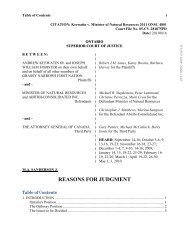Cronk v. Canadian General Insurance Co., 1995 CanLII 814 (ON CA)
Cronk v. Canadian General Insurance Co., 1995 CanLII 814 (ON CA)
Cronk v. Canadian General Insurance Co., 1995 CanLII 814 (ON CA)
Create successful ePaper yourself
Turn your PDF publications into a flip-book with our unique Google optimized e-Paper software.
VI THE AWARD OF VA<strong>CA</strong>TI<strong>ON</strong> PAY<br />
Ground (c) of the appeal, above, alleged error in law in the additional damages in<br />
respect of vacation pay calculated at 8% during the period of notice. This was in<br />
accordance with the usual practice as illustrated by Bohemier v. Storwal<br />
International Inc. (1982), 40 O.R. (2d) 264 at 270 (approved by this court at 44<br />
O.R. (2d) 361, leave to appeal to the Supreme <strong>Co</strong>urt of Canada refused at 3<br />
C.C.E.L. 79), which contains no discussion of the issue. The appellant's<br />
submission is that this statutory benefit accrues only when the employee has<br />
unused vacation entitlement accruing and owing at the time of termination. The<br />
vacation allowance, it is said, is merely an entitlement to time away from work<br />
during the employment period, and that it cannot accrue during the notice<br />
period. The entitlement to vacation pay is not part of the common law but is<br />
governed by Part VIII of the Employment Standards Act, R.S.O. 1990, c. E.14.<br />
I agree with the per curiam judgment of the British <strong>Co</strong>lumbia <strong>Co</strong>urt of Appeal (a<br />
five judge panel) in Scott v. Lillooet School District No. 29 1991 <strong>CanLII</strong> 740 (BC<br />
C.A.), (1991), 60 B.C.L.R. (2d) 273, which contains a full discussion of the<br />
vacation pay issue at pp. 276 to 280, and which concludes as follows:<br />
Vacation pay arises as a result of the contract of<br />
employment providing for a period of time during the<br />
employment year when the employee is not required to<br />
'work' but yet is entitled to pay.<br />
During the 15-month notice period awarded to the<br />
respondent, he was free from any obligation to the<br />
appellant, either to go to work or to expend any effort<br />
on its behalf.<br />
In the case at bar, the respondent led no evidence of<br />
loss or expense associated with lost vacation benefits<br />
nor did he lead any evidence that he had suffered in<br />
any way as a result of his not being able to take a<br />
meaningful holiday.<br />
To award the respondent damages for vacation pay, on<br />
top of an award of full salary for the period of notice to<br />
which he was entitled, (which necessarily includes<br />
payment of his salary for any vacation he may have<br />
taken had he worked during that notice period), is to<br />
provide double indemnity, or put another way, to<br />
provide compensation for loss that he has not suffered.
















